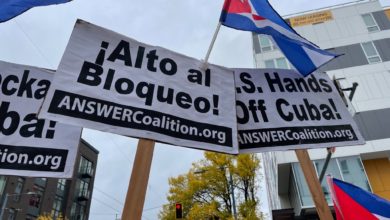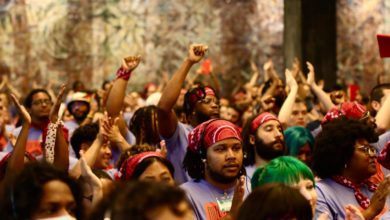 Cartoon by Gerardo Hernández Nordelo, one of the Cuban Five unjustly convicted for opposing anti-Cuban terrorists. Photo: Gerardo Hernández Nordelo |
Ana Lucía Rodríguez, 60, is the widow of Wilfredo Pérez Pérez, the captain of Cubana Airlines flight 455. She and her three children lost their husband and father on Oct. 6, 1976. On that fateful day, Pérez guided the passenger plane into the air, on a flight from Barbados to Cuba.
The plane carried 73 people: 57 Cubans, 11 Guyanese and five North Koreans. Six minutes later two bombs exploded on the plane. The final moments of sheer terror that filled the plane live on in the voice box recording, as the pilots valiantly struggled against the inevitable. All 73 people on board died.
Neither the passengers nor the crew could know that their lives would be cut short by the brutal, cowardly, fascist act orchestrated by two terrorists on the CIA’s payroll, Luis Posada Carriles and Orlando Bosch.
Newly declassified FBI and CIA documents prove what was known for decades: Posada was central to the planning and execution of the Cubana explosion and massacre, known in Cuba as the Barbados crime.
His accomplice was Orlando Bosch. Bosch now lives in Miami, thanks to George H.W. Bush’s 1990 intervention.
Now, Luis Posada Carriles is expecting the same favor from Bush Junior. In late March, Posada secretly entered Miami to seek “asylum.” He undoubtedly received assistance in entering the United States.
U.S. police agencies, from Homeland Security to the FBI, feign ignorance about his whereabouts in southern Florida. Bureau spokeswoman Judith Orihuela said on April 25, “If he is here illegally, it’s not something the FBI would have jurisdiction on.”
U.S. created anti-Cuba terrorist network
How has Posada, an admitted terrorist, managed to escape arrest? The answer is simple: The U.S. government created the anti-Cuba terrorist apparatus. Posada was always a central operative, willing to conduct the most monstrous actions on behalf of his bosses.
Miami is the heartland of the largest CIA operation ever assembled on U.S. soil. More than 4,000 rightwing Cubans who left Cuba after the 1959 Revolution were trained in explosives, sabotage and counter-revolutionary activity. Beginning with the establishment of the JM/Wave CIA base and training center in 1962, the CIA’s sole objective has been to sow terror against Cuba and its people in the desperate hope of destroying the socialist country.
After decades of mayhem and terror, with impunity granted by Washington, Posada expected that his asylum appeal would be granted without delay. What Posada and his handlers did not anticipate is that intense opposition is growing in the United States demanding his immediate arrest and extradition.
Venezuela’s Washington embassy issued a formal extradition request to the U.S. State Department on May 13. An extradition accord exists between both countries. Venezuelan Foreign Minister Alí Rodríguez said, “We hope for the greatest diligence from U.S. authorities, given that the United States, like Venezuela, has been a victim of terrorist actions. One of the most obvious and proven cases of terrorism, is that of the international terrorist Luis Posada Carriles.”
Posada and Bosch planned and directed the Cubana bombing in Venezuela. With help from the CIA, Posada escaped in August 1985 from San Juan de Los Morros prison in Venezuela, where he was serving time for the plane bombing.
 Family members of Capt. Wilfredo Pérez Pérez who was killed in the 1976 bombing of a Cubana Airlines plane. Photo: Gloria La Riva |
Posada’s history is a series of one terrorist action after another.
In the 1970s, as director of the Intelligence and Prevention Services Division of the national police in Venezuela, Posada oversaw the killing of Venezuelan leftists.
After his escape from Venezuela, Posada moved to El Salvador, where he commanded the supply of arms to the Nicaraguan contras from the Ilopango U.S. airbase.
During the 1990s, anti-Cuba terrorists stepped up their activities against Cuba on behalf of Washington. The U.S. imperialists and their agents thought that with the collapse of the Soviet Union, Cuba would be an easier target for economic sabotage.
In 1998, Posada admitted in an interview from July 12 to 13 with New York Times reporter Anna Louise Bardach, that he received money from members of the Cuban American National Foundation. It was understood that the funds were for terrorist actions. In turn, Posada paid Salvadoran and Guatemalan individuals to fly to Cuba and place bombs in hotels.
The objective? To sow terror and discourage tourists from visiting Cuba at a time when the island was developing tourism as a principal source of income.
On a sunny afternoon, Sept. 4, 1997, 32-year-old Fabio Di Celmo had just bid his friends good-bye after they spent the day swimming at the famed Copacabana Hotel in Havana. An Italian citizen, Di Celmo loved Cuba and hoped to move there. As he walked through the lobby of the Copacabana, a bomb exploded. Shrapnel pierced Di Celmo’s jugular vein and he bled to death. In the Times interview, Bardach relates Posada’s chilling comments. “Mr. Posada admitted authorship of the hotel bomb attacks (against Cuba) last year (1997). With a rueful chuckle, Mr. Posada described the Italian tourist’s death as a freak accident, but he declared that he had a clear conscience, saying, ‘I sleep like a baby… That Italian was sitting in the wrong place at the wrong time.’”
That was not the end. In November 2000, Posada Carriles was caught with weapons and C-4 explosives in Panama City, Panama, along with Guillermo Novo Sampol, Gaspar Jiménez Escobedo, and Pedro Remón. Their target was Cuban President Fidel Castro, who was set to speak in a university auditorium. If their attack had been successful, the president and hundreds of Panamanian students would have perished.
Although convicted, the men only received four to eight-year sentences. Then, days before leaving office, Panama’s president, Mireya Moscoso, pardoned Posada and his collaborators. Moscoso has never hidden her sympathies for Miami anti-Cuba terrorists.
Venezuela had sought Posada’s extradition from Panama in 2001, but Moscoso refused.
It may be that time has run out for Posada Carriles. The struggle that is waged in the United States could be critical in finally securing justice for Posada’s victims and helping stop the terrorism that Cuba has had to endure for 45 years.
Throughout Latin America and in the United States, progressive organizations and even the bourgeois media are calling for his expulsion from the United States and trial in Venezuela or an international tribunal for the Cubana terror bombing.
In the United States, the anti-imperialist ANSWER Coalition (Act Now to Stop War and End Racism) immediately launched a massive letter-writing campaign to Bush and Congress. In just three weeks, over 20,000 letters were sent to Bush.
Major U.S. newspapers, from the New York Times, USA Today, the San Francisco Chronicle to the Miami Herald, are calling for Posada’s extradition.
In Cuba, President Fidel Castro and other leaders are daily briefing the entire population and the world on the country’s demand for justice. Hundreds of thousands of Cubans have demonstrated against the U.S. haven for terrorist Posada.
 Relatives of Cuba’s national fencing team and teachers that died in 1976 plane bombing. Photo: Gloria La Riva |
Ricardo Cabrera, 22, was part of Cuba’s national fencing team. Fresh from a Pan-American competition in Venezuela, the entire team, women’s and men’s division, had won every gold medal in Caracas. Thrilled with their victory, they were heading home.
His sister, Lilia Caridad Cabrera (pictured on this page third from left), still cries when she speaks of her brother. “I was 16 years old. They came to tell us about the plane as I was leaving for school in the morning.
“That day, sadness came to reside in our home.
“He was studying architecture. As a youth, he grew up in the process of the Revolution. As the oldest, he gave us younger siblings a lot of guidance and support. My family has never recovered from his loss. We can’t accept the idea that at only 22 years, he died from such a horrible and sad death.
“I want to ask the American people: please unite with us, don’t shelter Posada Carriles in the United States. Help us get justice. He needs to receive justice or he will continue to commit terrorism, including against the people of the United States. Please understand our feelings of sorrow that engulf us. Help us win justice.”





